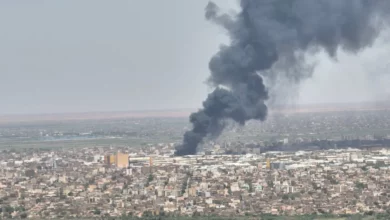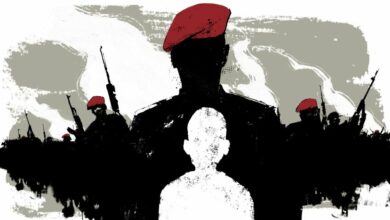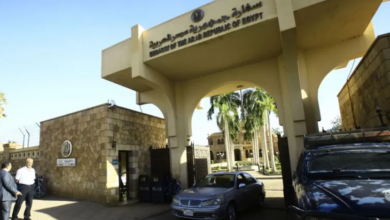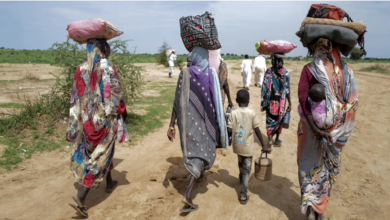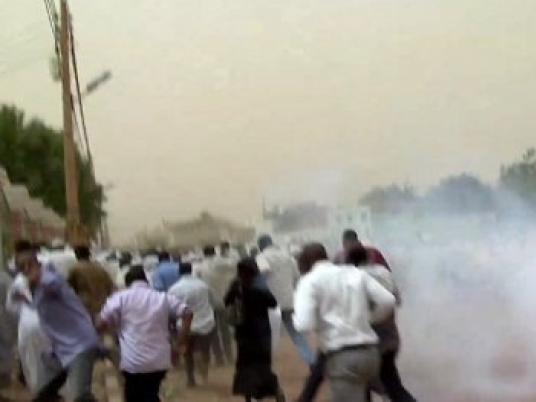
KHARTOUM — The largest and longest demonstrations against Sudanese President Omar al-Bashir’s 23-year rule erupted last month at Khartoum University, with protesters denouncing increased food and fuel prices as well as new, government-approved austerity measures.
Young activists had planned to start their protests on 30 June to coincide with the regime’s planned celebrations of the 1989 coup in which it had swept to power. The demonstrations were due to be organized under the slogan “The last 30 June,” to send the message that the regime would not see another full year in power.
But female university students preempted the planned protests and staged their own on the night of 16 June. The next day, their male counterparts joined them, outraged at the violent suppression of the women’s protest.
These protests have had precursors. Similar protests broke out on 30 January last year around the time of the first Arab Spring demonstrations, but were suppressed and overshadowed by the resounding revolutions elsewhere, which absorbed the attention of the international media.
The Sudanese government passed austerity measures in June in response to the budget deficit. They included the cancellation of fuel and sugar subsidies, while taxes were also increased on other basic commodities.
An economic crisis in the country had begun in the aftermath of South Sudan’s secession, which stopped the flow of revenue from oil production, once one of the chief sources of national income. Furthermore, Sudan’s army is deployed on three fronts — the Blue Nile, South Kordofan and Darfur — which is reported to cost US$1.5 million every day.
Crackdown
The police, security services and gangs of supporters of the ruling National Congress Party that have come to be known locally as the rabbata — a Sudanese term for bandits — responded brutally to the protests. Tear gas, batons and rubber bullets were used, but the protest movement grew stronger and expanded beyond Khartoum University to other campuses across Sudan.
Soon the protest movement formulated new demands, the most important of which was the departure of Bashir, who is wanted by the International Criminal Court on charges of committing war crimes and crimes against humanity.
The Sudanese street sympathized with the student movement, which also received the support of opposition figures, independent national figures and journalists. Meanwhile, the government’s suppression of the protests intensified. Random detentions became rampant, and dozens of local and foreign reporters were detained and mistreated. Foreign reporters were forced out, in an attempt to quell the revolution quietly.
Protesters staged their first Friday protest on 22 June, under the title “Kattaha Friday,” using a Sudanese word for sandstorms. The protests swept across much of Khartoum, and later spread to cities in the north, west, east and central parts of the country. Khartoum and its universities had become the epicenter of an uprising.
Fayez Abdallah, a medical student at Khartoum University, says he witnessed the breakout of the protests at the student housing.
Hundreds of female students chanted against high prices, Abdallah says. As the chants echoed through the area, police and armed civilians arrived and started shooting rubber bullets and tear gas, causing many students to faint. Others gave them first aid, while elements from the rabbata began to harass the women.
News of protests spread throughout the university, and clashes broke out between students and the police. The students went out on to the streets and the confrontations continued for a long time.
The police finally managed to gain control of the situation and chased the students off under a cloud of tear gas. Several students, including Abdallah, were injured.
“Security forces shot a tear gas canister at me, which I tried to dodge, only to get injured in my leg,” he recounts. “On another day, security forces attacked the student hostels and shot tear gas canisters at us, causing several injuries.”
Abdallah was later detained along with several others and remained in jail for 14 days without charge. He was released after being tortured, he says, and forced to sign a pledge “not to harm the country’s security.”
With the increasing protests and mounting popular wrath, the Sudanese opposition, with its civilian and armed groups, announced its support for the uprising. Meanwhile, Malek Aqar, the head of the Sudan Revolutionary Front — an alliance of armed opposition movements — also announced his support and called on the people to join the protests, and preserve their peaceful nature.
In his first response to the protests, Bashir said the demonstrations were supported by foreign powers and that they did not reflect the opinion of the Sudanese people. He described the protesters as “eccentric-thinking.”
Protesters responded to the president’s speech the following Friday, staging defiant protests that were dubbed the “Friday of Eccentric Thinking,” in several Sudanese cities and Khartoum neighborhoods.
The protests did not stop. On Kattaha Friday, young people divided themselves into small groups, gathered in neighborhoods and burned car tires in main streets, before moving on to other areas.
This is how the Sudanese street and ordinary citizens prepared for protests before they took on a more regular form, with sit-ins at the major mosques in Omdurman and Khartoum, and protests in neighborhoods.
Bad luck for Bashir?
Saif Eddin al-Safy, an activist with the group Tagammu Shabab al-Ummah, which is closely linked to the moderate-Islamist National Ummah Party, says that on 13 July, about 2,000 people gathered inside and outside Abdel Rahman Mosque in Omdurman. After the prayers ended, they chanted, “Freedom, peace and justice, revolution is the choice of the people.”
At that moment, a large police force arrived and once again launched tear gas into the peaceful crowd. The police and the rabbata attacked brutally. Even after the protest was broken up, they continued to raid nearby homes and use tear gas on those living there, causing serious injuries.
Several of the activists who took part in the protests were detained and tortured. Hundreds were reportedly detained, and several were charged with “undermining public security, rioting and sabotaging public property.”
The Deim area in central Khartoum has had the largest demonstrations. Observers believe Deim saw intense activity due to the grudges locals harbored against police, after they killed a woman named Awadeyya in front of her home a few months ago. Her murder sparked protests that were violently dispersed.
Confrontations between the police and protesters were the most violent in Deim, with protesters burning a police vehicle, an act to which police responded by detaining and torturing hundreds of citizens.
The next day, on 14 July, the neighborhood seemed like a military zone, with thousands of armed forces patrolling the area and randomly detaining young people.
Around the Abdel Rahman Mosque in Omdurman, there were also violent confrontations.
“The police used tear gas intensely and the protesters responded by hurling stones at them. The protesters set up barricades to prevent police cars from raiding the neighborhood. But security personnel were patrolling the place in civilian attire and detaining people,” recalls activist Serag Omar.
He says hundreds were detained, and that along with tear gas and rubber bullets, police used live ammunition on the protesters. He says he saw people in civilian attire carrying Kalashnikov rifles and arresting people.
He now fears the protests will become increasingly violent. Neighborhood youth have formed self-defense groups.
Political crisis
Political analyst Faisal Mohamed Saleh says he thinks Sudan is going through a political crisis. “The economic crisis is only one aspect of the general crisis rocking the country. The Sudanese regime has lost its legitimacy. Judging by the experiences in neighboring countries, however, it is hard to tell when the regime will be decisively brought down,” Saleh says.
Saleh says the current protests will either lead to a revolution that will bring down the regime or constitute one stage in the ongoing unrest.
“The country is now open to many scenarios. The regime may still have a chance if its reading of current events leads it to the conclusion that there is a crisis and that it cannot continue,” he says.
Alternatively, the regime might pass up this opportunity, as Hosni Mubarak, Muammar Qadhafi and Ali Abdullah Saleh did, he says.
“If so, the country will plunge into confrontations with the current regime. This could lead to heavy losses, tear the country apart and prompt open military confrontations, because the military and security institutions are politicized and liable to suffer rifts.”
Saleh adds that traditional opposition movements, such as the Ummah and Ettihadi parties, are working to prevent this scenario, but that the regime so far seems unable to adequately respond to peaceful initiatives.
This piece was originally published in Egypt Independent's weekly print edition.

